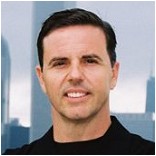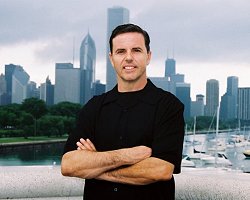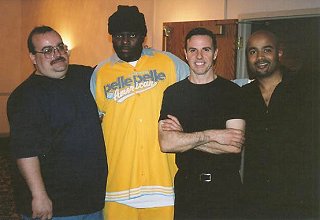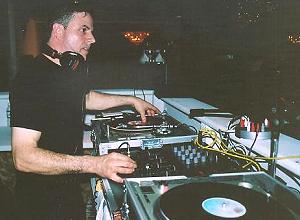Mickey 'Mixin' Oliver
Interview (January 2005)
| Name: | Mickey Oliver |
| Type of DJ: | Club & Radio-DJ, Remixer |

Mickey 'Mixin' Oliver of the Hot Mix 5
My friend Joe Delfin and I are standing in the lobby of the Chicago Park Hotel, waiting for Mickey “Mixin” Oliver to come down from his room. It is January 15th, 2005 on a typical freezing winter night in the Windy City. Oliver is in Chicago to DJ at an event called the “Old School House Music Reunion” taking place in the main ballroom of that very hotel, and featuring the biggest names ever in the history of Chicago music. There are five names featured, and Oliver’s name is one of them.
After what seemed like an eternity, he emerges, surrounded by fans. It appears that with his trademark Hot Mix 5 jacket with the name “Mickey” embroidered on the front, along with his DJ flight case stuffed with precious vinyl, he was an easy target for his fans to spot. Gracious as always, he took the time to hear their stories, accept their hugs, and pose for pictures. Joe and I managed to whisk Oliver away from that group so that he could relieve Kenny “Jammin” Jason on the turntables, only to be stopped several more times along the way, by groups of fans sharing their recollections of how much he had touched their lives.
Finally arriving at the DJ booth, Oliver prepares to go on. The booth suddenly fills with throngs of people, wanting to witness or videotape Oliver in action. In all the commotion, someone trips and Oliver’s records crash to the ground. He quickly collects and stacks his records, as security manages to clear everyone else out of the booth. The anticipation on the dancefloor keeps building. As soon as the emcee announces Mickey “Mixin” Oliver, the capacity crowd of 1,500 goes wild, erupting into applause while chanting, “Mickey, Mickey…” Oliver responds with his familiar voiceover by the legendary comedian Rodney Dangerfield. Everyone screams in joy and jacks their bodies throughout his set, as he flawlessly mixes one old school house track into the next. Utilizing all the tricks and skills that only a battle champion DJ can possess, Oliver whips his crowd into a frenzy with his masterful use of voice drops and scratches. Records literally fly off the turntable as he throws down one record after another in rapid succession. Mickey “Mixin” Oliver has successfully rocked the house once again.
Such is the experience of witnessing one of the true founding godfathers of house music. As one longtime fan, Michael Konoff put it, “The impact that he had on me is more than all other DJs combined. I think it has something to do with the way his style, combination, and tricks invoke emotion from the music he selects.”
The list of contributions made by Mickey “Mixin” Oliver toward the establishment, and advancement, of house music is astonishing. He is credited with producing the very first house remix for an artist on a major label, “Bottoms Up” by the Chi-Lites, hitting the Billboard charts in January of 1983. From there Oliver went on to found the legendary imprint Hot Mix 5 Records, leading to perhaps his most famous original production, the Billboard charting Speak-n-Spell hit “In-Ten-Si-T.” His megamixes such as the one he made with Johnny George in 1980, called the “MasterMix Medley” on Disconet, plus “Hunks and Chunks” and “Hot Mixin ‘85” are all landmarks in dance music history. He’s also one of the originators of a style called “hot mixing,” which incorporated the effects from reel to reel editing, grooveboxes, and micro edits, along with spinning and scratching over vinyl. Though perhaps his biggest contribution was as an original member of the Hot Mix 5, hand picked by program director Lee Michaels in 1982 to start the very first house music radio mixshow team in the world, broadcast on Chicago’s legendary 102.7 fm WBMX.
Home recordings of his groundbreaking mixshows spread far beyond the city limits of Chicago, finding their way to all corners of the globe, and changing the face of dance music forever. To this day people still forward his mixes, proving that although styles and technology had changed, those mixes have definitely stood the test of time. Tom Haack from Belgium explained that people still talk about Mickey “Mixin” Oliver’s WBMX mixes on the internet message boards over there, nearly 20 years after they first aired, because they were so incredible. David G. Yadan of Parisonic Records in France called Oliver a “hero of the French underground.” Oliver responded to all the adulation from his fans overseas by simply stating, “I’m honored that people feel that way about me. I look forward to coming back to Europe, where everyone really seems to understand and appreciate house music, and what we were trying to do.”
By the early 1990’s, house music had become firmly entrenched and accepted into the mainstream of dance music. Accomplishing what he had set out to do, Oliver decided to do the unthinkable. One of the most skilled and influential DJs in the world chose to leave DJing behind to focus on other things. Those “other things” involved a move from Chicago to Scottsdale, Arizona, where Hot Mix Radio Network, a syndicated radio mixshow service, was being established by Andy Starr and Dave Rajput. They approached Oliver to help create the ten-hour “Mix of the Eighties” demo in order to achieve the best mix possible. Shortly thereafter, Oliver founded PowerHouse Remix Service with Starr, devoting his considerable “ear for music” to create DJ friendly remixes of popular songs.
After much outcry from legions of fans who’ve yearned to have Oliver return to his rightful place in the clubs and behind the decks, with enthusiastic support from those whom he’s directly influenced, such as Bad Boy Bill and DJ Rap, he was convinced to get back into DJing. Coming full circle, Oliver is back where he started and where he belongs, in front of huge crowds showing everyone how it’s supposed to be done.
Currently in the recording studio with his production engineer QUBIQ, Oliver is busy putting his highly anticipated dance album together. In the meantime, Oliver had recently released a filtered club track for Turn The Tables Records called “Heart’s Desire” featuring house diva Loni Clark, showcasing her powerful vocals. His upcoming house/trance influenced single “Is It Love?” incorporates the angelic vocals of Jane Sheldon, who has been compared to Jewel, but with a style all her own that enhances Oliver’s classic songwriting.
In addition, Oliver’s mixes can currently be heard across North America through Sirius Satellite Radio, on “Remix” channel 62. And after an absence of over a decade, his mixes can once again be heard on the same frequency in Chicago where everything started in the first place, on the successor to WBMX, now called V103.
hotdiscomix was able to catch up with the legendary house music pioneer Mickey “Mixin” Oliver for a revealing Q&A, where he shares some of the secrets of his success and longevity in an environment of rapid change, and why he’s not satisfied to rest on his laurels.

hotdiscomix: Please tell us about yourself.
Mickey Oliver: I started out as a DJ from the south side of Chicago’s suburbs. I’m pretty much self-taught. I taught myself how to be a DJ first, stressing energy and the ability to create it and sustain it. Next I created many new DJ techniques. I also taught myself DJ editing on reel to reels. I was fortunate enough to be hand picked by program director Lee Michaels of radio station WBMX (now V103). He put his faith in Kenny Jason, Ralphi Rosario, Farley “Jackmaster” Funk, Scott Silz, and myself. Together we were called the Hot Mix 5. Our show became quite special in that we were taped and sent all across the globe. I showcased all of my new techniques and skills that I brought to the radio waves. Kenny, Farley, and Ralphi all had their unique styles, which made the show outstanding.
hotdiscomix: How and when did you get your first club gig? At what club and where was it?
Mickey Oliver: I started my DJ career at Smuggler’s Inn in Munster, Indiana. It was here where I made a local name for myself.
hotdiscomix: Do you recall the records you were playing at the time?
Mickey Oliver: I was playing artists like Rick James, Kool and the Gang, the Chi-Lites and so on.
hotdiscomix: What is the favorite club at which you worked and what’s the biggest crowd you’ve ever spun for?
Mickey Oliver: Some of the best clubs that I was fortunate to perform at, were in Ibiza, London, Manchester, Barcelona to name a few. Some of these crowds were in excess of 10,000. There were a lot of great times.
hotdiscomix: Are there any DJs in the industry whom you hold in high esteem? Who and why? What quality or style do they possess that you admire?
Mickey Oliver: Johnny George was a pioneer in that he held values like me, as in holding energy, sustaining it and how one plays a song. We passed a lot of info back and forth to each other. I always looked up to him. The Hot Mix 5 was another obvious influence in my life as they all had something very special about their specific craft. Bad Boy Bill came from Chicago and grew up listening to our show and took DJing to a whole new level. It’s been a pleasure to watch Bill and his career as he has flourished greatly. He has always been someone that I have enjoyed seeing his name out in the scene. Danny Tenaglia was another great one that I have always looked up to. Danny helped me out in my past and I always look out for Danny, and like to listen and read as to what he is doing. He is always on the cutting edge of dance music.
hotdiscomix: Please describe the typical Mickey Oliver DJ set. What genres of music do you play from the ‘80s, ‘90s and today?
Mickey Oliver: A typical DJ set of mine is usually not anything specific, but one can always count on energy and lots of different flavors. I don’t play songs just to play them, as I try to make a song more exciting by adding creative ideas to it. Some very minimal and others more dramatic. But always in the end creating a theme, as trying to make a particular DJ set a theme that keeps on building.

Kenny "Jammin" Jason, Farley "Jackmaster" Funk,
Mickey "Mixin" Oliver, Steve "Silk" Hurley
hotdiscomix: Please tell me a bit more about your radio mixshows and the legendary Hot Mix 5 team.
Mickey Oliver: First, I’ve been syndicated three different times. I feel very fortunate in that I’ve been able to play my mix style coast to coast, on over a hundred stations on a given weekend. The Hot Mix 5 was a group of guys that were in a unique point in time. Each guy had his own style, which made the show unique, and each seemed to draw a different type of audience to the show. This was evidenced by the fact that the show set the ratings record for the most listened to show in Chicago. We had an 80% share on Saturday nights. That means in the 2nd biggest market in the US (at the time), eight out of ten radios were tuned into our show. It was a new novelty, in that dance music was being brought to the airwaves, and styles of DJ mixing were being developed to a new level of excitement. Our show was taped and sent around the world. As the show went on, we introduced a new genre of music, called house music. This is where house music got its exposure; on the Hot Mix 5 show in Chicago on radio station WBMX. There were so many great musicians in Chicago who were writing this new style of music called house music. We were fortunate to be able to expose these musicians to the public and help house music begin a music revolution. It’s probably a bold statement, but DJing as we know it today, was greatly influenced by this radio show. I was hired in many cities, where over and over, there would be a group of DJs that would approach me and say, “Here is our version of the Hot Mix 5!” They’d have five DJs that would be replicas of us. It was very flattering that the show made such an impact in places all over the world where it wasn’t even broadcast. I couldn’t even understand how this was happening.
hotdiscomix: Were your radio mixshows live mixed or pre-produced tapes?
Mickey Oliver: My radio show in the day was both live and pre-recorded. Sometimes on a Friday, I would go to the radio station and mix three hours live. Other times, it was pre-recorded. It depended on how booked I was on a given night.
hotdiscomix: Have the Hot Mix 5 team only used their own “hotmixes” or sometimes also remixes from remix services?
Mickey Oliver: We used many different versions of songs. Sometimes they were our own created mixes and other times they were from remix services. My philosophy was that it is not the song you play, but how you play the song. I wanted the song that I play to be a unique form of energy that is more uplifting than the current version that others play. On Sirius Satellite Radio, I’m on the “Remix” and on the message boards the listeners are very flattering regarding me. They seem to like what I play, but it isn’t what I play in my opinion, it’s how I play the songs.
hotdiscomix: How important are remix service (Disconet, Hot Tracks, Ultimix, etc.) productions in your DJ sets and radio mixshows?
Mickey Oliver: Remix services are a very helpful tool to a DJ in how he can make his show smoother and more user friendly to an audience. I feel strongly in that remix services help record labels, as well as a DJ succeed in their trade.
hotdiscomix: Was a live club mixshow a strong encumbrance for the DJs?
Mickey Oliver: Live shows in clubs were very enjoyable as I could feel the energy of the room, thus I could bring that energy into my performance that evening.
hotdiscomix: How and when did you start doing your own edits and remixes? Where did you pick up these skills?
Mickey Oliver: I’ve basically taught myself my editing techniques. Johnny George influenced me, when we worked on the “MasterMix Medley.” Johnny is very talented and knows how to create and sustain energy. I expanded my editing techniques during the ‘80s, while doing my weekly Hot Mix 5 radio show. There were no computers with editing software when I started, so I did tape editing with a razor blade. I had a few reel to reels and did tape looping and micro edits.
hotdiscomix: What was your first remix pressed on vinyl and what was your popularly acclaimed remix?
Mickey Oliver: My first remix was for the Chi-Lites. They wanted me to bring the street sound of house music to their recording called “Bottoms Up.” I had never been in a recording studio before that, so it was all new ground for me. The song was released and made number eight on Billboard’s dance chart. One megamix I did was called “Hunks and Chunks.” It seemed to have a following from DJs, as I still get an interview here and there, as to how it was created.
hotdiscomix: Do you have a special manner in which you remix your songs? Are there any specific features that make your remixes Mickey “Mixin” Oliver remixes?
Mickey Oliver: I do all of my remixes on computer nowadays compared to back in the day when all of my recordings were done on sequencers and multi track analog studios. I've always been known for my elaborate transitions introducing changeups in a track.
hotdiscomix: So far what has been the biggest triumph of your remixes/productions?
Mickey Oliver: What has been the most exciting for me is doing a remix and watching it go up the charts. One always feels fortunate to be in a position to be able to accomplish this.
hotdiscomix: In 1986, the legendary house music label Hot Mix 5 Records started out. Please tell me a bit about your function and work for Hot Mix 5 Records.

Mickey Oliver: Hot Mix 5 Records was very special for Kenny Jason, Ralphi Rosario and myself as we put our heart and soul into it. The three of us all shared in on the production and remixes and it didn’t matter what remix version a DJ or person on the street liked as long as we were able to get as many songs played as possible. We weren’t concerned about who made the best remix, as it was one for all and all for one.
hotdiscomix: In 1991, you help found the PowerHouse Remix Service. Please tell me a bit about your function and work for PowerHouse.
Mickey Oliver: When PowerHouse Remix Service was created, I got together with Andrew Starr of the Hot Mix Radio Network. We decided to do a joint partnership. I created the first release, a two record set, with remixes from Ralphi, Kenny, Jimmy Drosses, and Edward Crosby. Together, we as DJs created a new style of remixing in that it had a house influence. We did a lot of production on that first issue and sold out in a brief period of time. After that, PowerHouse expanded and created a very solid name for itself.

hotdiscomix: Please describe your mixing technique and tricks.
Mickey Oliver: My mixing technique is always a creation of energy. I feel like each song must keep building, and although the song one plays is important, what is more important is how you play the song. I also believe in adding voice drops, special effects, and additional keyboards. The keyboards I add to current songs are usually unnoticeable on the surface, but enough to add that little extra bit of energy.
hotdiscomix: You’ve probably seen the entire evolution of DJ technology. What do you think was the biggest DJ technology breakthrough?
Mickey Oliver: The biggest breakthrough has been the explosion of music software for computers. With the software the amount of creativity can be as in depth as one cares to be.
hotdiscomix: Of all the decades in which you have worked, which one is the most special to you and why?
Mickey Oliver: Each has had its excitement, but the ‘80s stand out for me because a genre was born, house music, which in my opinion, helped kick off dance music. I feel dance music really got pointed in a direction from the creation of house music. From house came garage, techno, trance and others. House music had a major influence in the history of dance music.
hotdiscomix: Tell us something about your current projects.
Mickey Oliver: Currently I’m getting ready to film a video of my new release “Is It Love?” I’m very optimistic for this project and it’s the leading song from my forthcoming album From Above. Be on the lookout!
Witnessing Mickey “Mixin” Oliver on the turntables is a rare treat, like watching Michael Jordan play basketball on the championship Bulls team. You already know great things are going to happen, and he will prove you right every time. Mickey “Mixin” Oliver has defined an era, and now he’s back to remind everyone how it’s supposed to be done. Welcome back!
For bookings or interview requests email sratz@juno.com